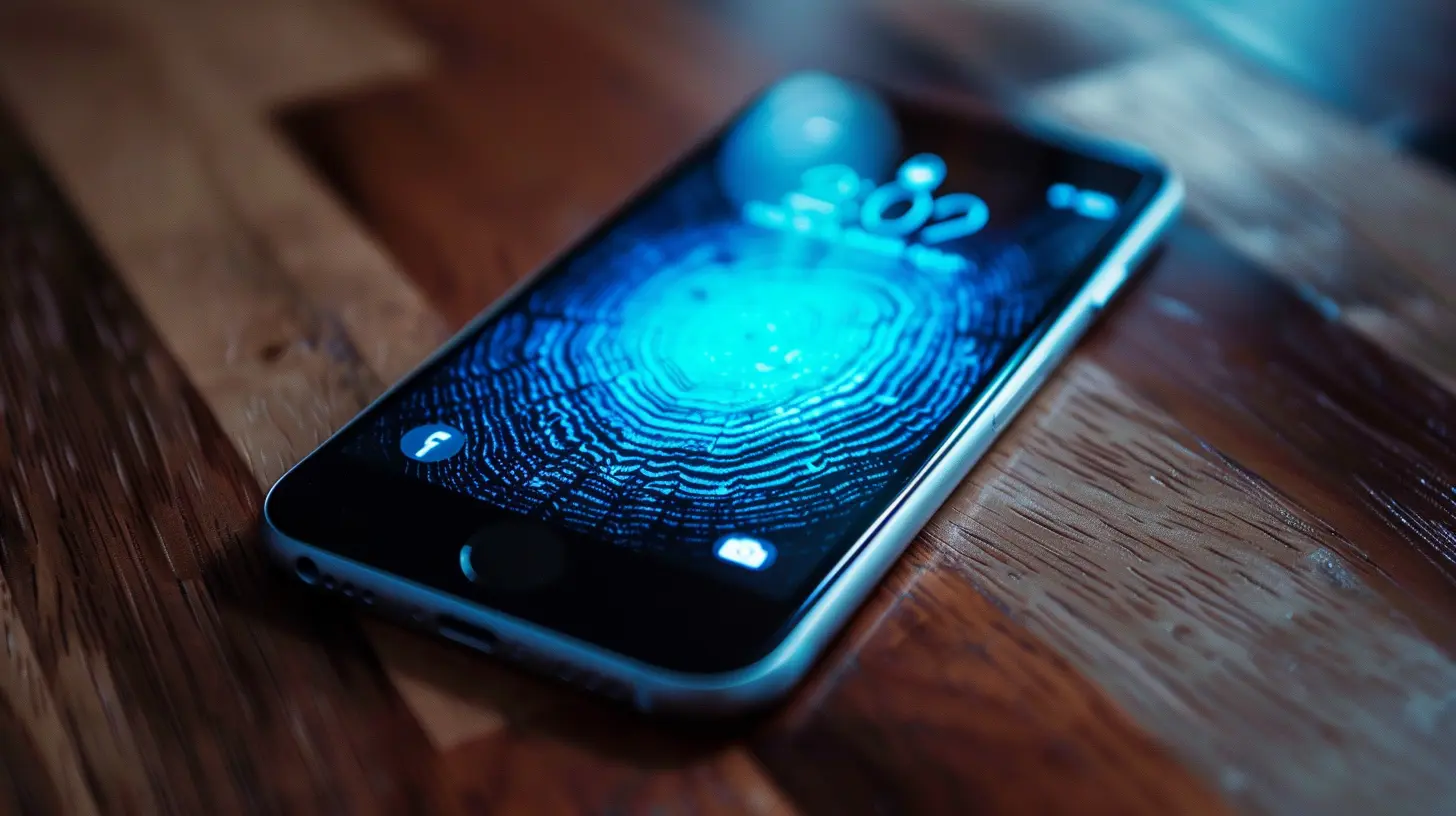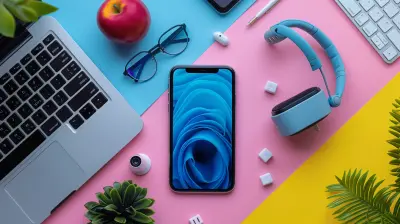Exploring the Future of Smartphone Security: What’s Next?
18 May 2025
We live in a world where our smartphones have become an extension of ourselves. From financial transactions to personal photos, our entire lives are stored on these tiny, pocket-sized devices. But with great convenience comes great responsibility, and that responsibility lies in protecting our data.
As technology continues to evolve, so do the methods used by cybercriminals to breach our personal security. So, what does the future hold for smartphone security? What's next in the line of defense against hackers, malware, and data breaches? Let's dive deep into the future of smartphone security and explore the innovations that are set to shape tomorrow's security landscape.

The Current State of Smartphone Security
Before we start speculating about the future, it's useful to understand where we are now. Modern smartphones are equipped with several layers of security, including:- Biometric authentication (fingerprints, facial recognition, iris scanning)
- Encryption for data protection
- App permissions to control what data apps can access
- Two-factor authentication (2FA) for an extra layer of login security
- Regular software updates to patch vulnerabilities
While these measures are already quite advanced, they are far from impenetrable. Cybercriminals are continually finding new ways to break through these defenses. So, what's next in smartphone security? Let’s take a closer look at some of the emerging trends and technologies.

1. AI-Powered Threat Detection
Artificial intelligence (AI) is already playing a significant role in several industries, and smartphone security is no exception. AI can analyze patterns of behavior on your smartphone, learning what is normal for you and what isn’t. This could lead to more dynamic and intuitive security measures.For example, if your phone detects an unusual login attempt from a location you’ve never been to, AI could flag this as suspicious activity and take action—whether that’s locking your device, sending you an alert, or requiring additional verification before allowing access.
How Could AI Improve Security?
- Anomaly detection: AI can monitor your usage patterns and flag any deviations from the norm.- Real-time threat analysis: AI-powered algorithms can scan for malware, phishing attempts, and other threats in real-time, blocking potential dangers before they cause harm.
- Behavioral biometrics: AI can continuously monitor how you interact with your phone (e.g., how fast you type, how you hold your device) for added layers of security.
Imagine AI as your personal bodyguard, always on the lookout for suspicious behavior. And the best part? It never sleeps.

2. Advanced Biometric Authentication
Biometrics have already made a splash in the world of smartphone security—most notably with fingerprint scanning and facial recognition. But these technologies are just the tip of the iceberg.What Comes After Fingerprints and Faces?
In the near future, we could see more advanced forms of biometric identification, including:- Iris scanning: Already available on some devices, but expect this to become more widespread and refined.
- Vein recognition: This technology scans the unique pattern of veins in your hand or finger, offering an additional layer of security.
- Voice recognition: Your voice is as unique as your fingerprint, and voice recognition could be a more secure way to unlock your phone or authorize transactions.
- Heartbeat authentication: Yes, you read that right. Researchers are exploring the possibility of using your unique heartbeat pattern as a form of biometric authentication. It’s like having a password that’s always with you—literally.
Multi-Factor Biometrics
Another exciting development is the concept of multi-factor biometrics, where multiple biometric methods are combined for enhanced security. For example, instead of just using your fingerprint, your phone might also require a facial scan or a voice command. This makes it much harder for attackers to spoof your identity.
3. Quantum-Resistant Encryption
We’ve all heard of encryption, but have you heard of quantum encryption? With the rise of quantum computing, traditional encryption methods could soon become obsolete. Quantum computers have the potential to crack even the most complex encryption algorithms in a matter of seconds.What’s Quantum-Resistant Encryption?
Quantum-resistant encryption (or post-quantum encryption) is a new form of cryptography designed to withstand attacks from quantum computers. While quantum computing is still in its infancy, it’s only a matter of time before it becomes a real threat to current encryption standards.In the future, smartphones may need to adopt quantum-resistant encryption to keep your data safe from the next generation of cyber threats. This would ensure that even the most advanced computers can’t break through your security.
4. Blockchain for Secure Transactions and Authentication
You’ve probably heard of blockchain in the context of cryptocurrencies like Bitcoin, but this technology has much broader applications. One exciting potential use of blockchain is in smartphone security.How Can Blockchain Improve Security?
Blockchain technology offers a decentralized and highly secure way to store and manage data. In the context of smartphones, it could be used for:- Secure transactions: Blockchain could enable highly secure, tamper-proof transactions, making it harder for cybercriminals to steal your financial information.
- Decentralized authentication: Instead of storing your login credentials on a centralized server (which could be hacked), blockchain allows for decentralized authentication. This means your data is distributed across a network of computers, making it much harder to compromise.
- Tamper-proof records: Once data is recorded on the blockchain, it can’t be changed or deleted. This could be useful for tracking and verifying the authenticity of software updates, ensuring that you’re not downloading malware disguised as a legitimate update.
Blockchain is still relatively new in the world of smartphone security, but it has the potential to revolutionize how we protect our data.
5. Secure Operating Systems (OS)
Another trend we’re likely to see in the future is the development of highly secure operating systems. While Android and iOS have made significant strides in security, they are not immune to attacks.What Would a Secure OS Look Like?
- Built-in encryption: A secure OS would have encryption baked into its very core, making it harder for hackers to access your data.- Automatic updates: One of the biggest vulnerabilities in smartphone security is outdated software. A secure OS would ensure that all devices receive automatic security updates as soon as they are available.
- Minimal data collection: A secure OS would prioritize user privacy by minimizing the amount of data it collects. This would reduce the risk of personal information being exposed in the event of a data breach.
There are already some attempts to create more secure operating systems (e.g., GrapheneOS, which focuses on privacy and security), but expect this trend to grow in the coming years.
6. Enhanced Privacy Features
In addition to security, privacy is becoming a major concern for smartphone users. Companies are starting to introduce more privacy-focused features to help users regain control over their personal information.What Privacy Features Can We Expect?
- App tracking transparency: Some operating systems, like iOS, already give users more control over how apps track their data. In the future, this could become even more granular, allowing users to control exactly what information each app can access.- Encrypted messaging by default: While encrypted messaging apps like WhatsApp and Signal are already popular, we could see more widespread adoption of end-to-end encryption across all communication channels.
- On-device data processing: Instead of sending your data to the cloud, more smartphones may start processing sensitive data (like voice commands or biometric information) directly on the device. This reduces the risk of your data being intercepted during transmission.
7. The Rise of Zero-Trust Architecture
"Zero-trust" is a term you’ll likely hear more often when discussing the future of smartphone security. The idea behind zero-trust architecture is simple: Trust no one.How Does Zero-Trust Work?
In a zero-trust model, every request to access your smartphone, whether it’s from an app, a service, or a network, is treated as untrusted by default. This means that even if a hacker manages to infiltrate one part of your phone's system, they won’t automatically gain access to everything else.- Continuous verification: Instead of relying on a single login event (e.g., entering your password), zero-trust architecture continuously verifies your identity at multiple points.
- Micro-segmentation: Your phone’s data is divided into smaller segments, making it harder for attackers to move laterally within the device if they do manage to breach one area.
This approach could significantly reduce the impact of data breaches and other security incidents.
Conclusion: A Safer Smartphone Future
Smartphone security has come a long way, but the battle between security professionals and cybercriminals is far from over. As we’ve seen, the future of smartphone security will likely involve a combination of AI-powered threat detection, advanced biometric authentication, quantum-resistant encryption, and blockchain technology, among other innovations.But perhaps the most important trend is the increasing focus on privacy and user control. In the future, you’ll have more power over your data than ever before—whether that’s through decentralized authentication, zero-trust architecture, or enhanced privacy features.
As smartphones continue to play an ever-larger role in our lives, the need for robust security measures will only grow. So, what’s next in the world of smartphone security? The answer is clear: a safer, smarter future is on the horizon.
all images in this post were generated using AI tools
Category:
SmartphonesAuthor:

Reese McQuillan
Discussion
rate this article
3 comments
Reese Kane
Future phones: unlocking with a wink and a giggle!
June 1, 2025 at 10:28 AM

Reese McQuillan
That’s an intriguing idea! Combining biometrics with playful elements could make unlocking phones more fun and secure.
Valerie McKibben
The future of smartphone security relies on AI, biometric advancements, and decentralized authentication methods.
May 25, 2025 at 4:56 AM

Reese McQuillan
Absolutely! AI and biometric advancements are pivotal for enhancing smartphone security, while decentralized authentication methods promise to further safeguard user data. It's an exciting evolution!
Clarissa Lewis
Future smartphone security: will it be a fortress or just another password we forget?
May 24, 2025 at 4:50 AM

Reese McQuillan
Smartphone security will evolve, balancing robust measures with user convenience, but user education is key to avoiding reliance on forgotten passwords.



